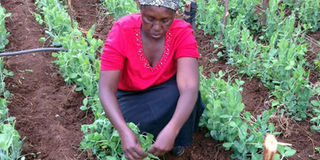Breaking News: At least 10 feared to have drowned in Makueni river
Peas farmers have a reason to smile after EU lifts five-year ban

Magdelene Gichuki tends to her snap peas on her farm in Eldoret. Farmers of peas, particularly those growing sugar snaps and mange tout varieties, now have a reason to smile, thanks to the lifting of the five-year ban by European Union. PHOTO | STANLEY KIMUGE | NATION MEDIA GROUP
What you need to know:
In 2013, farmers of peas were not adhering to the EU market requirements by exceeding Maximum Residue Limits.
This forced EU to slap a ban on the two crops because of the failure by exporters to conform to the 10 per cent MRLs requirement.
Farmers of peas, particularly those growing sugar snaps and mange tout varieties, now have a reason to smile, thanks to the lifting of the five-year ban by European Union (EU).
According to Kenya Plant Health Inspectorate Service (Kephis) managing director Esther Kimani, EU’s commission saw the determination farmers had in adhering to their standards and decided to lower the checking levels to five per cent.
“Farmers were able to learn fast and adhered to the requirements, a thing that forced the EU to drop its checking level of percentage from 10 to five per cent,” she says.
MRL REQUIREMENT
Following this amendment, Kenya’s produce will now be checked at the five per cent level.
In 2013, farmers of peas were not adhering to the EU market requirements by exceeding Maximum Residue Limits (MRLs) on produce which was detected on entry to the EU markets.
"This forced EU to slap a ban on the two crops because of the failure by exporters to conform to the 10 per cent MRLs requirement," Ms Kimani, told the Nation.
RIGHT CHEMICALS
She however noted that the county produce are still checked but randomly adding that farmers particularly small holder will not incur extra costs on their produce because of extended checks at the EU points of entry.
Ms Kimani says Horticulture Competent Authority, a committee chaired by Kephis and coordinated by the ministry of Agriculture managed to bring down the level of MRLs as well as sensitise farmers on importance of using the right chemicals and quantities.
She says Kephis continues to monitor farmers so that they don’t trip back.
SH100 BILLION
According to data from Kephis, the country has exported 9,969,351 pods of beans and 2,375,932 for peas between January and July this year.
EU is Kenya’s main market for flowers, fruits, vegetables and herbs which translates to more than a Sh100 billion a year in foreign exchange.
Ms Kimani said that now farmers have a wide range of market opportunities.




